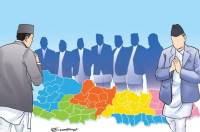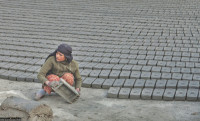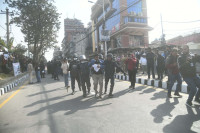Opinion
Resettled and remaining
The resettlement of Bhutanese refugees, generally lauded as a success, has not been without unanticipated consequences.
Craig Sanders
The Tamang family will face many unknowns as they begin a new life in faraway Canada and I am moved by the courage of their decision to leave their home—even if that home for the last 22 years was a refugee camp.
Resettlement so far
After generously hosting refugees for 15 years, Nepal’s policymakers also took a courageous and far-reaching decision back in 2007 when they opened the door to resettlement of refugees from Bhutan. At the time, some 108,000 refugees from Bhutan were accommodated—some may say
‘warehoused’—in seven refugee camps in eastern Nepal with few prospects for a lasting solution.
The government’s decision to support resettlement became a catalyst for international support, which dramatically turned around a once protracted, seemingly dead-end situation. Eight countries—Australia, Canada, Denmark, the Netherlands, New Zealand, Norway, the UK and the US—responded to Nepal’s overture and by late 2007, resettlement was under way. Today, five refugee camps have been closed and less than 27,000 refugees remain in two camps.
The majority of the remaining refugees—over 23,000—have expressed an interest in resettlement and their files are in various stages of review by UN High Commissioner for Refugees (UNHCR), the International Organization for Migration (IOM) and the resettlement countries. The commitment of resettlement countries remains strong and so, departures are expected to continue into the future.
Meanwhile, another 3,900 refugees have not expressed an interest in resettlement—some may harbour hopes of return to Bhutan while others may wish to remain in Nepal where for some, their lives have become intertwined with Nepalis. Today, we know of over 1,600 refugee men and women who have married Nepalis and almost 2,000 children have been born of these ‘mixed marriages’.
New challenges ahead
The resettlement of refugees from Bhutan has been generally lauded as a success story, though this is not without some unanticipated consequences. Earlier this week, a news report described former refugee camps and the surrounding communities as ‘ghost towns’, underscoring what happens when refugees—and their earning and spending power—leave the area. The flip side of that coin, however, is that remittances are also flowing back to Nepal from refugees who have been resettled.
As the refugee camp population steadily declines, UNHCR and a small group of dedicated partners are working to maintain basic services in the camps. Economies of scale have been lost in recent years and most sectors are struggling to keep up standards. Education is a case in point.
The latest scores for the School Leaving Certificate (SLC) exams have declined once again—only one in 10 eligible refugee students passed. No surprise, when you consider that last year almost 60 percent of the refugee teachers (223) and nearly a third of the student body departed on resettlement. There are no quick fixes for such disruption and high turnover in the classroom but business as usual is not the answer.
Today, all stakeholders with an interest in solutions for refugees from Bhutan are confronted with new and complex challenges, which simply did not exist several years ago. The good news is that the commitment and support of government, donors, resettlement countries and UN and NGO partners remains strong. All stakeholders, however, need to be ready to embrace new approaches—and to take new decisions.
While the decision taken in 2007 to launch resettlement has not been a panacea for all refugee problems, it certainly paved the way for refugees like young Suman Tamang and his family to open a new chapter in their lives. That is an important and encouraging lesson to consider as we look at the challenges ahead.
Sanders is UNHCR Representative in Nepal




 9.12°C Kathmandu
9.12°C Kathmandu










